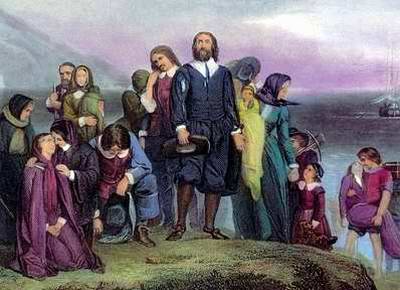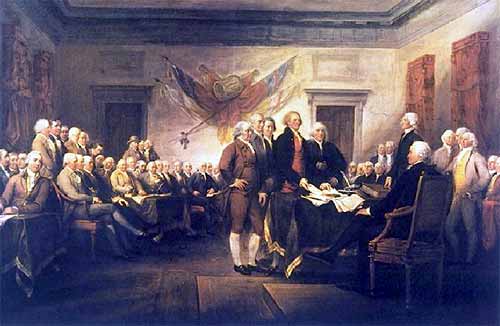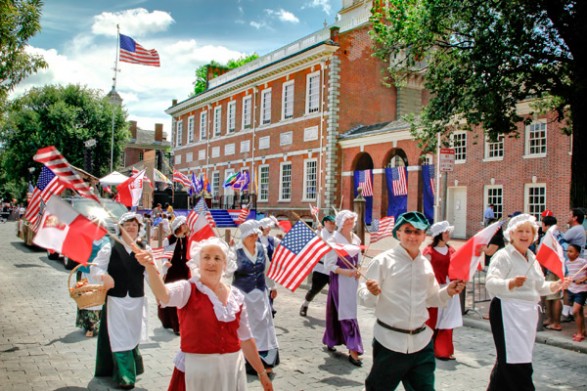The American colonies were settled in the 17th century by Europeans, mostly English, French and Dutch. They came to the New World for two main reasons:
First, for religious and social freedom (the puritans, for example, fleeing religious persecution in England, settled in New England).
Secondly, for economic freedom. Many colonial settlers saw an opportunity to grow rich through hard work and skill in business. These two themes, religious freedom and mercantilism, are keys to understanding the colonial experience, and contemporary America, too.
In 1607, English traders established the first settlement in America, and called it Jamestown, in the colony of Virginia.

THE PURITANS
Also known as the Pilgrims, they landed in the ship the Mayflower at Plymouth Rock in Massachusetts in 1620. They fled England to escape religious persecution.
The puritans' brand of rigidly strict behaviour and self-denial set the tone throughout the New England colonies. Puritanism is still evident today in the American character.
Life in the colonies was extremely difficult in the early years. Fortunately, the native Americans, known as Indians, were friendly and helpful to the new settlers, teaching them how to grow certain crops. Their kindness was never returned, however. Within a few generations, the American Indians would become victims of what some people call a policy of genocide.
ENGLAND
Throughout the mid-1700's, England ruled America with a heavy hand. The English imposed governors on the colonies, collected taxes that were often excessive and regulated trade in their own favour. The colonists resented these acts, and began to see them as interference in their own affairs. In 1773 some colonists, disguised as Indians, destroyed a shipment of British tea in Boston harbour to protest a tax on tea. This famous act of revolt, known as "The Boston Tea Party", began the process that led to the War For Independence.
THE WAR FOR INDEPENDENCE
The American colonies fought the war to gain their freedom from England. During the course of the war, the thirteen colonies declared their independence and established the United States of America. They also wrote a constitution, the fundamental laws and principles by which the country is still governed today. The Colonial Army was headed by Gen. George Washington. The British Army was far better equipped and more experienced. But the Americans fought a kind of guerrilla war with great fervour, since they were defending their homes and families.
1774: The first Continental Congress meets. Each of the thirteen colonies sends delegates to consider steps to take towards independence.
1775: The first battle of the war occurs in April, in Lexington, Massachusetts. Today it is referred to in American folklore as "the shot heard round the world".
1775: Second Continental Congress. The Americans debate the idea of declaring independence and begin to formulate the constitution.
1775: Famous battle of Bunker Hill, in Charleston, near Boston. It is won by the English, but at great lost. The Americans consider it a moral victory.
1776: On July 4th (now celebrated as Independence Day), the thirteen colonies sign the Declaration of Independence. Its famous words have been learned by generations of American schoolchildren: "We hold these truths to be self-evident, that all men are created equal …"
1781: After several years of intermittent fighting in which neither side can gain a clear advantage, the American Army, aided by the French forces, surround the British General Lord Cornwallis at Yorktown, Virginia, and force him to surrender. This battle ends the war.
The French played a major role in the war. Figures like Lafayette and Rochambeau fought alongside the Americans. Lafayette was decorated as an American hero after the war.
FORMING A GOVERNMENT
After the war was won, another battle remained. The new country's leaders had to persuade the colonies to accept a national, or "federal" government. The colonies were fiercely independent, and feared that the new federal government would be as bad as the British. But after much debate, the Federalists succeeded.
1787: The Constitutional Convention creates the final version of the United States Constitution.
1788: The constitution is ratified by the thirteen States, and so becomes law.
1789: George Washington is elected the First President.

TODAY
The Americans still celebrate Thanksgiving Day in remembrance of the Pilgrim Fathers who, in 1620, thanked the Indians for their help and shared their first crop with them. Thanksgiving is on the 4th Thursday of November. The following Friday is always a holiday.Thanksgiving is an important feast. Americans spend it with their families and friends, eating the famous turkey, sweet potatoes and pumpkin pies. A lot of Americans watch the Thanksgiving Parade on T.V.

THE 4th OF JULY
Every 4th of July, the Americans celebrate Independence Day, the birth of a new nation, in 1776, with the declaration of independence, which proclaimed that "all men are created equal".
The American Flag is known as the Star-Spangled Banner. The 50 stars represent the 50 American states; the 13 stripes represent the 13 original colonies which fought for American Independence in 1776. The Star-Spangled Banner is also the title of the National Anthem.
Still today you will see the American flag in many homes and front yards, especially since the recent wars and terrorit attacks.




